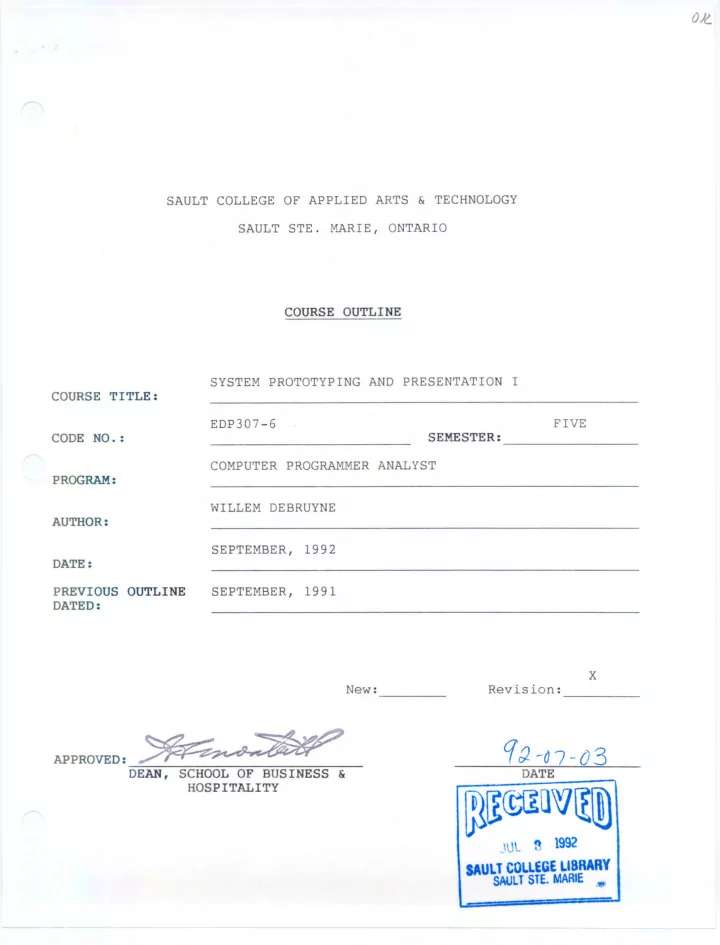

O)l SAULT COLLEGE OF APPLIED ARTS & TECHNOLOGY SAULT STE. MARIE, ONTARIO COURSE OUTLINE SYSTEM PROTOTYPING AND PRESENTATION I COURSE TITLE: FIVE EDP307-6 CODE NO.: SEMESTER: COMPUTER PROGRAMMER ANALYST PROGRAM: WILLEM DEBRUYNE AUTHOR: SEPTEMBER, 1992 DATE: PREVIOUS OUTLINE SEPTEMBER, 1991 DATED: x New: Revision: l' () -0 7 - 0 3 DATE SCHOOL OF BUSINESS & HOSPITALITY ~~@}a~~~ JUl ~ 1992 SAULT COLLEGE LIBRARY SAULT ST£. MARIE ,_ -
- 2 ED307-6 SYSTEM PROTOTYPING & PRESENTATION I COURSE CODE COURSE NAME CURRICULUM OVERVIEW: Introduction to Systems Analysis and Design Prerequisite: Data Base I Introduction to Fourth Generation Language Textbook: Working with Excelerator, Version 1.9, Allen Schmidt COURSE ROLE WITHIN THE PROGRAM: It has been stated that two of the most severe problems facing Information Systems today is the increasing backlog of service request and the decline in user confidence. The reasons for these problems stem from the traditional methodologies of developing systems which are not meeting these needs. The students have studied in detail the traditional development life cycle of business information systems. They are, therefore, prepared to study this new methodology of proto- typing and its apparent advantages of pleasing users, reducing development costs, decreasing communication problems, and so on. The industry is swinging towards prototyping and using tools such as Fourth Generation Languages which prepares the student to meet these new challenges. The student will use the CASE tool Excelerator to assist them in planning, analysis, design, documentation, and construction of a computer based information system in accordance to one or more software development methodologies. --
- 3 EDP307-6 SYSTEM PROTOTYPING & PRESENTATION I MODULE 1: Review Systems Analysis and Design role of the systems analyst the system development life cycle systems development methodologies how to anlayze an information system process modelling project dictionary feasibility and cost-benefit analysis fact-finding techniques MODULE 2: Prototyping (notes and EDP108 textbook) define prototyping compare prototyping to T.L.C.M. advantages vs disadvantages use prototyping to design and develop a computer based system (establish project) Case MODULE 3: (Presentation Topics) Sign out booklets, view video tape Software Requirements Analysis and Spec's - software engineering 1.2.1 - analysis and specification 1.3, 1.3.1, 1.3.2., 1.3.3. F.A.S.T. 1.4, 1.4.1 Software Requirements Analysis 1.5, 1.5.1, 1.5.2, 1.5.3 Prototyping Options 1.6 Commonly Used Analysis Tech. 1.7, 1.7.1, 1.7.2 Structured Analysis 1.8, 1.8.1, 1.8.2, 1.8.3, 1.8.4 1.9, 1.9.1, 1.9.2, 1.9.3, 1.9.4, 1.9.5, 1.9.6, 1.9.7, 1.9.8, 1.9.9, 1.9.12 Data Modelling 1.10, 1.11, 1.11.1 Analysis and Design Tools 1.12.1, 1.12.2, 1.12.3, 1.12.4 ---
- 4 - EDP307 SYSTEM PROTOTYPING & PRESENT. I Software Design: Impact on the Methodology 2.3, 2.3.1, 2.3.2, 2.4, 2.4.1 2.4.2, 2.4.3, 2.4.4, 2.4.5, 2.4.6, 2.4.7, 2.4.8, 2.4.9 Software Design 2.5, 2.5.1, 2.5.2, 2.5.3, 2.6, 2.6.1, 2.6.2 Procedural Design 2.7, 2.7.1, 2,7,2, 2,7,3, 2,8, 2,8,1, 2,8,2, 2,8,3, 2,8,4 Case: Technical Issues: Integration Issues 3.4.1, 3.4.2, 3.4.4, 3.4.5, 3.4.7, 3.4.8 Defining the Technology 3.6, 3.6.1 3.6.9 - Object-oriented programming 3.6.10, 3.6.12, 3.6.13, 3.6.15 Excelerator: MODULE 4: getting started with Excelerator graphics printing saving backups data flow diagrams exploding the D.F.D. drawing techniques structured charts presentation graphs data dictionary data modelling continue in EDP326 -- - ---
EDP307 SYSTEM PROTOTYPING & PRESENT. I STUDENT EVALUATION: a) Tests (3 @ 20) 60% Presentation 10% Paper (prototyping) 10% Execelerator Assignment (2 @ 10) 20% 100% 100% b) Grading: A+ 90 A 80 89% B 70 79% 69% C 55 R 0 54% NOTE: Students are expected to attend classes regularly, participate in class~di5CUssiQn~ conduct themselves and tre9t thei~ peers and inst~uctors Late assignments are subject to a zero grade unless the student has prior permission from the instructor to hand the assignment in at a later date. ---
Recommend
More recommend